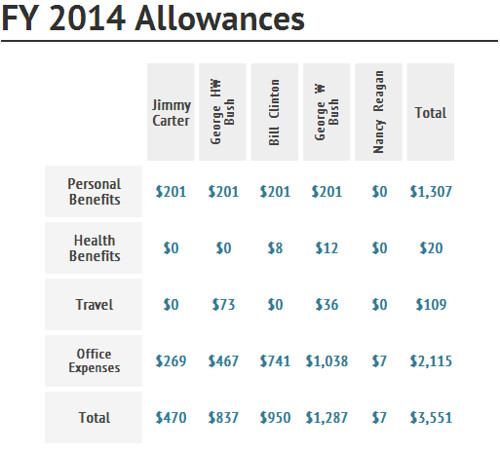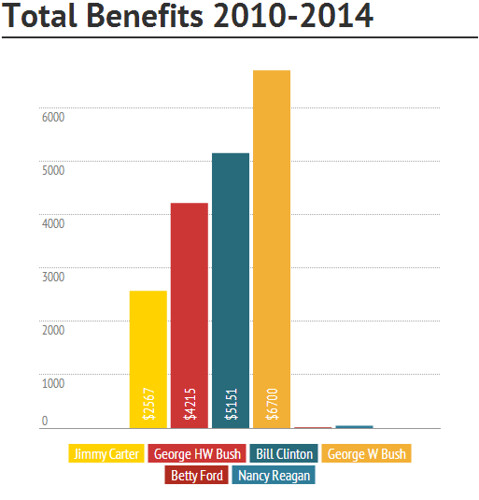 |
|
 |
|
During the long weekend of cookouts and fireworks, NTUF staff will reflect on how far our republic has come and the cost of that progress. We honor those who have served this great country and who continue to defend our freedoms and the ideals set out in the Constitution. Let freedom reign!
Former First Lady, Senator, Secretary of State, and potential 2016 Presidential candidate Hillary Clinton has been in the news lately for her remarks that she and her family endured financial difficulties upon leaving the White House. In an interview with ABC’s Diane Sawyer, Clinton said “[w]e came out of the White House not only dead broke but in debt. We had no money when we got there, and we struggled to piece together the resources for mortgages for houses, for Chelsea’s education. You know, it was not easy.” Some will question the degree of hardship the Clintons actually faced, especially in light of reports that she and her husband earn hundreds of thousands of dollars in fees at speaking engagements. What is clear is that as a former President, Bill Clinton is entitled to certain government benefits, totaling nearly $1 million each year. NTUF compiled a special series on this issue last year, comparing how each former President’s benefits stack up and how the policies establishing them were developed. This week, we offer an update on those totals in light of new information from the Congressional Research Service (CRS). Until 1958, Presidents were not eligible for any retirement benefits after leaving office, as many came from wealthy backgrounds and were able to live off of their savings or pursue new careers. However, Congress introduced the Former Presidents Act in 1957 after witnessing President Harry Truman struggle to keep up with the demands of replying to the public’s mail and speaking requests. President Eisenhower signed the bill the following year, funding former Presidents’ travel expenses, office rent, and staff compensation. Additionally, they are entitled to lifetime Secret Service protection, a benefit that was only recently restored. According to CRS, Congress appropriated $3.6 million for former Presidents’ benefits allowances in FY 2014. Most of that amount -- just under $1.2 million -- went towards paying rent for office space, which Presidents are allowed to establish anywhere in the country. President Clinton spent $450,000 on his New York City office’s rent, edging out President George W. Bush’s $440,000 space in Dallas for the most expensive. Each former President was also allotted $201,000 in federal pension benefits as the law requires, representing the second-highest expense from this year’s appropriation. The table below shows appropriations for former Presidents' benefits by expense category (note: "Office Expenses" includes rent as well as equipment, personnel, supplies, and other related costs). Since FY 2000, President Clinton has collected $15.9 million under the Former Presidents Act, 26.5 percent of the $60 million appropriated for all Presidents in that time (that total includes payments made to widows of deceased Presidents) and more than any other President. The next closest is President George H.W. Bush, who has received $14 million in pension and benefit payments since FY 2000. Total spending on former Presidents’ benefits has generally decreased over the years, down from a high of $4.2 million in FY 2003. CRS notes that after adjusting for inflation, the value of each former President’s pension and benefits has either decreased or stayed relatively constant except in the case of the elder Bush, whose benefits have increased in value from $776,000 in FY 1999 to $830,000 in FY 2014. Legislation in the 113th Congress
The President of the United States is one of the most visible offices in the world, and it requires substantial resources to respond to the amount of press and public inquiries that former Presidents receive even after they have left Washington D.C. The Former Presidents Act was designed to assist them in handling those challenges by providing administrative benefits. The reality, though, is that most modern Presidents are not destitute and are often able to parlay their visibility into greater private earnings. While it is important to ensure that former Presidents do not fall into poverty and are able to maintain contact with the public, it is equally vital for taxpayers to know exactly how much former Commanders-in-Chief are given in public benefits.
|
Donate |  |









 On behalf of the staff of National Taxpayers Union Foundation, we wish you a safe and happy July 4th! This weekend, we celebrate the Founding Fathers' efforts to establish a nation defined by personal and economic freedom. Over 238 years later, NTUF strives to help citizens across the country become better informed about the tax and spending issues that affect them in their daily lives. We aim to provide the research and analysis that taxpayers need to hold Congress accountable.
On behalf of the staff of National Taxpayers Union Foundation, we wish you a safe and happy July 4th! This weekend, we celebrate the Founding Fathers' efforts to establish a nation defined by personal and economic freedom. Over 238 years later, NTUF strives to help citizens across the country become better informed about the tax and spending issues that affect them in their daily lives. We aim to provide the research and analysis that taxpayers need to hold Congress accountable.

 Congressman Jason Chaffetz (R-UT)
Congressman Jason Chaffetz (R-UT)